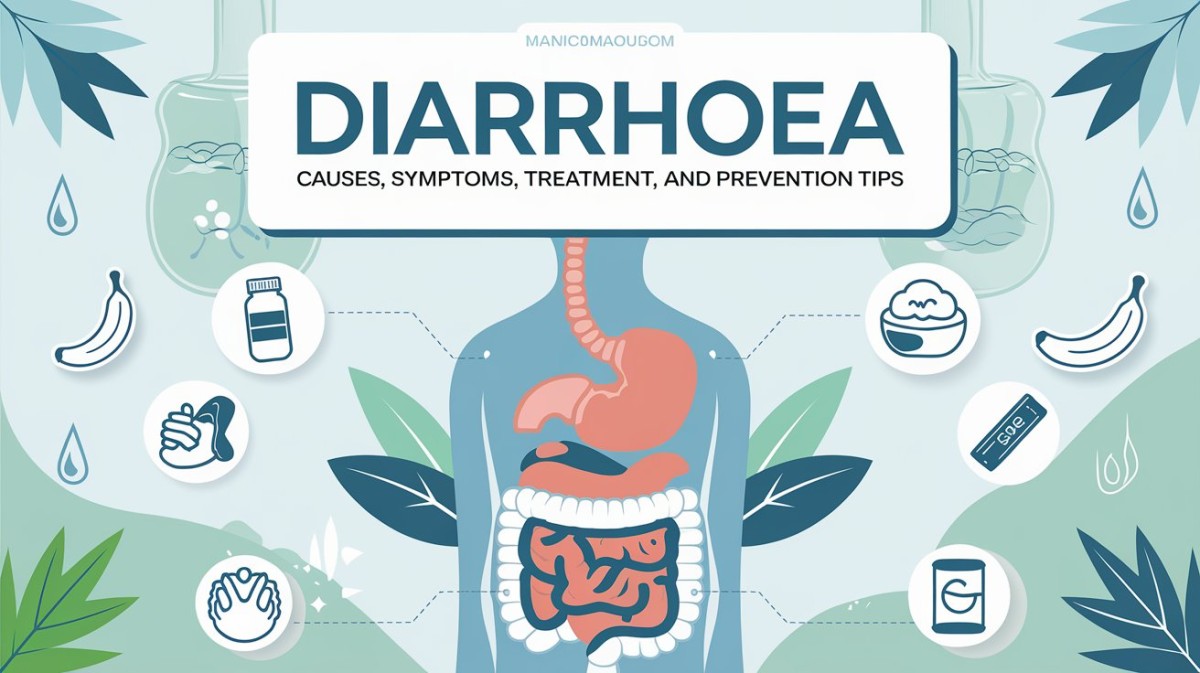Can you remember anytime you had an upset tummy that saw you disgraced in the public through constant vomiting? Diarrhoea is not just annoying; it may disrupt activities, cause weariness, and in severe cases lead to severe complications if not treated well.
What causes it? How can you prevent and treat it? This blog will walk you through everything you need to know about diarrhoea, helping you stay informed and prepared.
What is Diarrhea?
Diarrhoea is the passing of loose or watery stools in a single or consecutive intervals, beyond three times in a day. It is experienced in almost all disease causing organisms from simple bacterial and viral infections to more severe diseases such as cancer. Diarrhoea is broadly classified into two categories:
1. Acute Diarrhoea: Sometimes it may last for several days, but it is mainly occasioned by infections, and sometimes food poisoning.
2. Chronic Diarrhoea: It lasts for more than two weeks and may be related to a number of underlying medical conditions such as IBS or Chron’s disease.
Causes of Diarrhea

Therefore in order to manage diarrhoea it is important to know what causes it. Common causes include:
1. Infections:
❖ Bacterial: Pathogens include salmonella, Escherichia coli (E. coli) and Shigella and are mainly transmitted through food and water products.
❖ Viral: Viral gastroenteritis known as the stomach flu is caused by rotavirus, norovirus and adenovirus.
❖ Parasitic: Other Protozoa, such as Giardia lamblia and Cryptosporidium , are also causal agents of diarrhoea.
2. Food Intolerances and Allergies:
An intolerance to some food substances such as lactose or gluten makes a person develop diarrhoea upon taking foods containing such substances.
3. Medications:
❖ Probiotics may interfere with the unaffected balance of bacteria in the intestinal tracts thus causing diarrhoea.
❖ Loose stools may also be due to abuse of laxatives or unwanted effects of some drugs.
4. Chronic Medical Conditions:
Chronic diarrhoea can be caused by diseases such as Irritable bowel syndrome, Crohn’s disease, or ulcerative colitis.
5. Poor Hygiene and Contaminated Food/Water:
Contamination of water makes water unfit for drinking or handling of foods may lead to food borne diseases.
Symptoms of Diarrhea

The symptoms of diarrhoea can range from mild to severe, depending on its cause:
❖ Frequent, loose, or watery stools.
❖ Abdominal cramps or pain.
❖ Bloating and gas.
❖ Nausea and vomiting.
❖ Signs of dehydration (dry mouth, excessive thirst, dark urine).
❖ Fever or chills in any way possible.
Complications of Diarrhea
While diarrhea may seem harmless, it can lead to serious complications if left untreated:
1. Dehydration:
One of the most serious side effects, which consists that the person is dehydrated, can cause dizziness, tiredness, confusion and low blood pressure.
2. Electrolyte Imbalance:
The loss of chief body elements such as sodium, potassium, chloride etc. impacts the functioning of heart and muscles.
3. Malnutrition:
Cronization of diarrhoea can prevent the absorption of nutrients which compromise the immune system.
How to Treat Diarrhoea
Hydration:
❖ The primary goal is however to replace the lost body fluid. Consume lots of water, clear broths or ORS fluids recommended especially where the patient is dehydrated through more intake of fluids containing small proportions of salt and sugar.
❖ Do not take coffee, alcohol and even fruit juices, soda as these beverages can enhance dehydration.
Dietary Adjustments:
❖ Foods to Eat:
❖ Bananas: High in potassium they are good in replacement of lost electrolytes.
❖ Rice: Supplies readily available source of carbohydrates to serve as a source of energy.
❖ Applesauce: This contains pectin, a substance with an effect of making stool firmer.
❖ Toast: A dull and lacking vegetation type of diet that does not cause irritation to the stomach lining.
❖ Foods to Avoid:
❖ Dairy products (depending on the case of Lactose intolerance).
❖ Fried, fatty, or spicy foods.
❖ Foods high in fiber or that cause gas such as beans, broccoli or cabbage.
Medications:
❖ Other nonprescription drugs such as loperamide (Imodium) may help reduce the frequency of bowel movements.
❖ Prebiotics support the colonisation of the good bacteria into the small intestinal tract.
❖ Do not use medicines on your own; seek the doctor if the symptoms linger on.
Rest:
Give your body the rest it need by taking enough rest and avoiding rigorous activities.
Preventing Diarrhea
Maintain Good Hygiene:
❖ It is important to take a bath with soap particularly if one has gone to the wash room and before eating.
❖ To reduce cross-contact of similar food items keep kitchen surfaces and foods tools clean.
Drink Safe Water:
❖ Only drink filtered or boiled water; do not use tap water.
❖ Generally, do not consume ice made from questionable water or drinks while on a journey.
Eat Wisely:
❖ Always wash the fruits and vegetables before taking them or even preparing to eat them.
❖ Brown meat and cook seafood to the right temperature in order to eliminate bacteria.
Vaccination:
Some of the vaccines are those that can prevent serious diarrhea in children, such as the rotavirus vaccine.
When to See a Doctor
While mild diarrhoea often resolves on its own, consult a doctor if you experience:
❖ Moderate dehydration symptoms, severe dehydration symptoms (confusion, tachycardia).
❖ Bloody or black stools.
❖ They include signs such as high fever for a period of 101°F (38.3°C) or even more.
❖ Infections with diarrhea lasting for over two days.
For such more related content don't forget to check out our blogs on Treatments.
Conclusion
Diarrhea is a familiar problem, though potentially dangerous if treated inadequately. The following sections of this article contain valuable information about diarrhea’s causes, symptoms, prevention, and treatment. Ensure you take a lot of water, wash your body appropriately and check with your doctor incase of any signs of digestion complications.
Do you benefit from these tips? Feel free to discuss what you would like or anything you know about augmented reality in the comments below.
